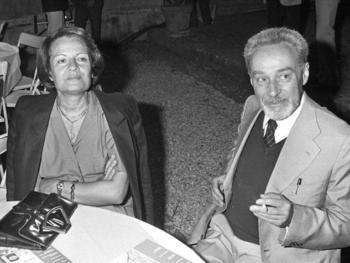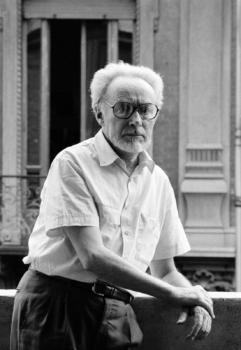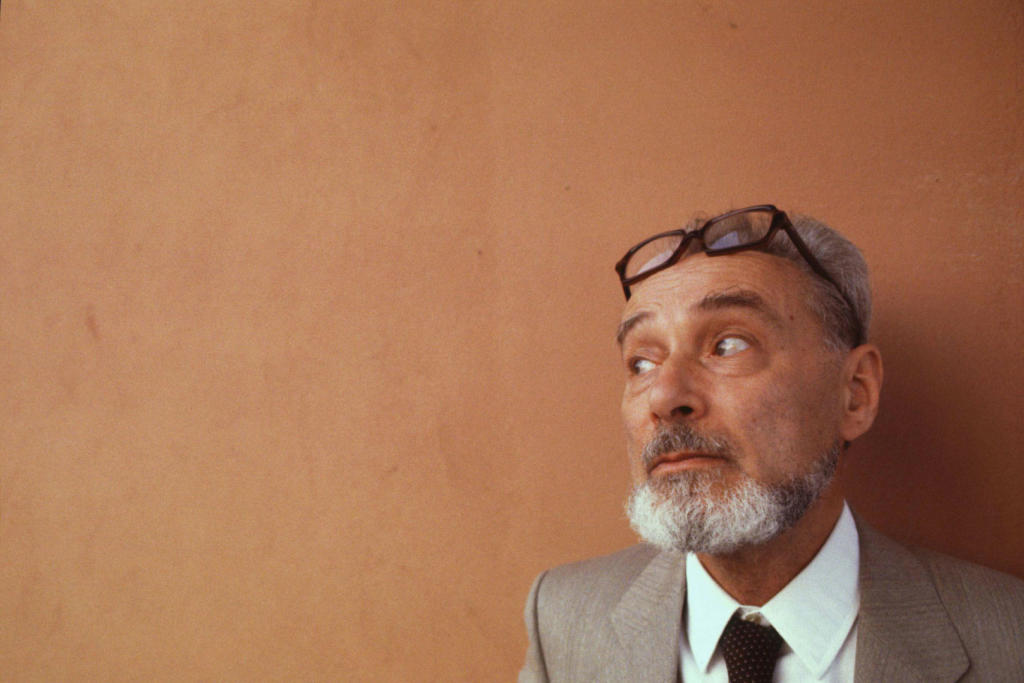 Thursday, May 28, 2015m a ceremony was held at the Montale High School of Rome was dedicated to Levi the chemistry lab. This fact has created an reflection opportunity on the relationship between chemistry and literature. This conceptwas organized by teachers and students with the participation of Professor Rosario Nicoletti from La Sapienza University of Rome.
Thursday, May 28, 2015m a ceremony was held at the Montale High School of Rome was dedicated to Levi the chemistry lab. This fact has created an reflection opportunity on the relationship between chemistry and literature. This conceptwas organized by teachers and students with the participation of Professor Rosario Nicoletti from La Sapienza University of Rome.
Generally in Rome initiatives commemoration of Primo Levi are held mostly on the memorial on 27 January. The intent of this article is to point out, also referring to other initiatives such as the above mentioned high school Montale, the importance of remembering his work and his testimony.
The war is always there. The rest is only truce.
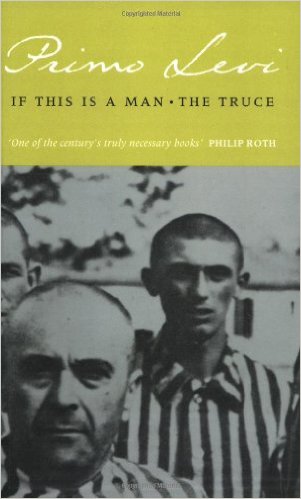 Indeed, war is always, it is the mind that does not change , it remains , chasing , biting and tearing away the flesh of days . This is the first impression , the sour taste of the first impact with the words of Primo Levi . Far more complex is the path that he did and wanted to testify .
Indeed, war is always, it is the mind that does not change , it remains , chasing , biting and tearing away the flesh of days . This is the first impression , the sour taste of the first impact with the words of Primo Levi . Far more complex is the path that he did and wanted to testify .
He took note of the pain, of the superhuman absurd, indeed inhumane, that can deny the very nature of humanity, the alternative is the yield, inaction, silence, or the path of the testimony. Levi, being aware of the imperfection of memory , as a man of science recorded everything objectively , before someone, perhaps he himself , could say one day that the details were inaccurate, not corresponding to the doses, to the components, to the the elements of insanity.
He has taken on the task, as an attentive and patient scientist , to record, transcribe and report in the form of words lists of events and gestures, dead bodies and alive , the Drowned and the Saved .
https://youtu.be/02p7llziiCw
The real voyage of Primo Levi has been in the memory to which he gave life step by step and from which he was gradually destroyed, like from a corrosive acid. Conscious of this, he never stopped, until he could, until he had the feeling of having the strength to continue to be useful to his fellows. As long as he felt able to evoke the horrors, preserving space for a smile, bitter but tenacious. 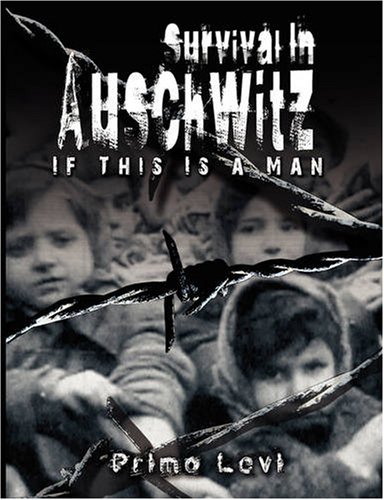 It was the evidence that the enemy had lost. Because life and humanity resist even to Auschwitz. Resisting to annihilation, to the ferocity planned with mechanical precision, with an industrial plant to transform men into inert matter. But inert matter cannot smile, and does not know how to recall, albeit with a heavy heart, all the occasions when in the death camps hunger for art remained alive, together with music, literature, or simply the will to live in spite of all, itself the primary form and absolute poetry.
It was the evidence that the enemy had lost. Because life and humanity resist even to Auschwitz. Resisting to annihilation, to the ferocity planned with mechanical precision, with an industrial plant to transform men into inert matter. But inert matter cannot smile, and does not know how to recall, albeit with a heavy heart, all the occasions when in the death camps hunger for art remained alive, together with music, literature, or simply the will to live in spite of all, itself the primary form and absolute poetry.
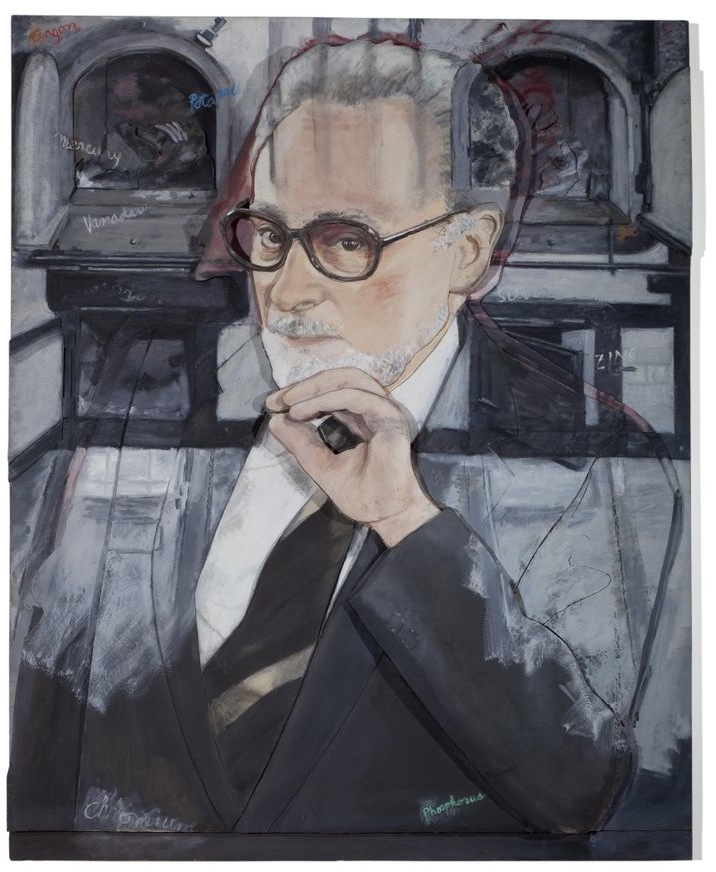 The starting point is Turin, a city suspended between tradition and innovation. The family of Levi at first passively accepts fascism, only to realize too late, like many other Italians, the destructive folly inherent in its belief and political and ideological choices .
The starting point is Turin, a city suspended between tradition and innovation. The family of Levi at first passively accepts fascism, only to realize too late, like many other Italians, the destructive folly inherent in its belief and political and ideological choices .
This makes happen, simultaneously, the paradoxes that mark the writer’s life: he, not religious, atheist before and after the events and massacres, is forced, since enactment of the racial laws , to fight and become a symbol of Judaism. In addition , after taking part in the partisan struggle, and after his arrest, he was sent to concentration camps. Just he, that would have dreamed a quiet life of study in its Turin, suddenly is thrown on the road by the hurricane of history. His personal story becomes a metaphor of the Diaspora. So he travels just to survive, to see with his own eyes, to remember and to tell .
Levi is the involuntary traveler par excellence. Being force to create a land, a space of survival , an extreme elsewhere, on the edge, is to understand, that is to assume itself , the voice of the pain of a people uprooted : ” … and, for the first time, the ancient grief of the people that has no land, the hopeless grief of the exodus which is renewed every century, descended into our souls ”
The theme of the trip is mostly present in two emblematic books of Levi “If this is a Man” and “The Truce”. The experience of the deportation and concentration camp in “If this is a Man” have to be understood as a forced descent into the underworld. In “The Truce” the theme is the returning home or rather, an attempt to leave behind the monstrosity of war and recover the deep sense of feeling alive and like the others. If the first Levi’s book resembles the description of a descent into hell, the return is the opportunity of a gradual ascent toward the light and toward the human .
The descent into hell has a wide tradition , whose culmination is the journey of Dante . But , unlike Dante , Levi does not have the gift of faith which supported the Florentine poet , and has neither the fatherly and benevolent Virgil nor the solemn and loving Beatrice . He is catapulted without any intro in a biological experiment – social annihilation . And with its living body , such as Dante , it is a debtor to other living bodies . Not souls but animals , with all that noble and poor sense inherent in this definition , and in the condition that involves and describes .
 A journey whose end is death, not the climb to Paradise. Or, in some special cases, such as that of the same Levi, a salvation which is sick, poisoned by its own inconceivable essence and existence.
A journey whose end is death, not the climb to Paradise. Or, in some special cases, such as that of the same Levi, a salvation which is sick, poisoned by its own inconceivable essence and existence.
The deadly mechanism put in place by the captors was intended to annihilate in the remaining internees all forms of humanity. As another side effect that practice has generated, in the surviving victims, a form of reflection in retrospect: the idea that to be saved are not the best, but only those supported by chance, by the luck that is middle voice, and blind . With something even more subtle, denying the “mad flight” of Ulysses. Are not the brave to overcome the Pillars of Hercules, and return to Ithaca, but only those who, for some case, or perhaps for some whim or usefulness of butchers, escaped the mesh of extermination.
It remains, at the time of the recovery of its name, in the return to the mainland, the new safe, a kind of creeping melancholy combined with an absurd but ineradicable guilt: to be left alive there where only death had citizenship.
No longer just a number, a fragment cataloged the assembly of extermination, it means having to go back to move, equivalent to the pain of returning to a country that will never again be the same, because we are no longer ourselves after hell. “The other prisoners of Auschwitz populate my memory of their presence without a face in an image and if I could enclose all the evil of our time, I would choose this, I am familiar with: a skinny man, his forehead bent and stoop-shouldered , on whose face and in whose eyes you can read track of thought, “writes Levi.
If This Is a Man is the book of the Exodus, the dissection of living matter, the tracking of the equipment for the death. But no less harsh is the book back. There is no more “normal” as possible for those who return from the circles of hell. He sees in the eyes of others pity, or a form of ill-concealed pity, or even the distorted mirror of implicit accusation of complicity with the perpetrators. This is the reflection of a thought that originates in the minds of the victims, but it is stubborn, also follows step by stepthose who would like to escape from their own memories.
“In the desert you can remember your name / ’cause there is not no one for to give you no pain”, recite the verses of a song that maybe Levi would have appreciated. The fact is that even the desert is a luxury, a privilege that some can not afford. Thus the need to move, to travel until you can. Levi returns repeatedly to Auschwitz. Accepting interviews and participating in TV documentaries that recall the years of the death camps. He says clearly and with a sense of rhythm anecdotes and figures, faces and words, the cold, the hunger, the smells. Talks about the various “sections” of the fields, speaks to help understand, to understand that he no longer hoped. He talks about himself, the greatest effort, the effort of Sisyphus. He speaks with an “understatement”, very Anglo-Saxon, indeed, much of Piedmont, an extreme form of defense against the real. Fighting to the end, he takes the same trains crossing Poland today a very different but with a wound still visible, still open. He talks about himself, Levi, to make clear that he has no merit, that he was saved because he was useful to the Nazis as chemical and because he had learned as a young man a few phrases of German. The difference between living and dying could be a peremptory order to understand or know how to read the numbers tattooed on their forearms as a brand.
 “The prisoners who saved themselves were not the best, the predestined to good, the bearers of a message: what I had seen and experienced showed the exact opposite. Survived the worst of preference, the selfish, the violent, the insensitive, the collaborators of the ‘gray area’, the spies. It was not a certain rule (there were, nor are there in human affairs, certain rules), but was also a rule. I felt so innocent, but trooped among the saved, and therefore constantly looking for an excuse, before me and the others. Survived the worst, that is the most suitable; the best are all dead, “he notes.
“The prisoners who saved themselves were not the best, the predestined to good, the bearers of a message: what I had seen and experienced showed the exact opposite. Survived the worst of preference, the selfish, the violent, the insensitive, the collaborators of the ‘gray area’, the spies. It was not a certain rule (there were, nor are there in human affairs, certain rules), but was also a rule. I felt so innocent, but trooped among the saved, and therefore constantly looking for an excuse, before me and the others. Survived the worst, that is the most suitable; the best are all dead, “he notes.
Written a year before his suicide, “The Drowned and the Saved” confirms the will of Levi to identify deeply with those who have had the pain of being submerged. The intent of the book is to give a voice to those who do not have it, renewing the appeal to the memory of readers about the Holocaust: do not forget, so that history is not repeated. It is no coincidence that the book opens with a quote from The Rime of the Ancient Mariner by Samuel Taylor Coleridge: Since then, at an uncertain hour, / that agony returns: / and till my ghastly that is Told / this heart Within Me burns.
The agony returns inexorable, and the need to tell the grim story burning heart incessantly. As well as burns the conscience of knowing that, in certain situations, in the most extreme lands of existence, there is no room for solidarity and triumphs unwritten law and yet powerful of the “mors tua vita mea.” The death of others can mean survival. The horror of this realization is not as strong as the atavistic instinct of preservation that drives us to rejoice for a loaf of bread in most and another day when you can not fall to the ground exhausted. The real journey, the more raw and more real, is what Levi, like thousands of other survivors and refugees of fate, has made in his head. The most extreme and most ruthless: the one from which there is no hope of escape, one that forces you to constantly think about the meaning of life, the disgust and attraction to the abyss of evil, the meaning and the absence of sense of everything, even death.
 In interviews Levi describes the importance of relying on words, the story, although here too conscious of the contradiction and ambivalence: “Then for the first time we realized that our language lacks words to express this offense, the demolition of a man. In a moment, with almost prophetic intuition, the reality has proved us: we drove down. Further down so you can not go: there is no more miserable human condition, and it is unthinkable. Nothing is ours: we have removed the clothes, the shoes, the hair; if we will talk, not listen to us, and if we listen, we do not understand. They take away the name, and if we want to keep it, we find in ourselves the strength to do it, to make sure that behind the name something of us, of us as we were, to remain. ”
In interviews Levi describes the importance of relying on words, the story, although here too conscious of the contradiction and ambivalence: “Then for the first time we realized that our language lacks words to express this offense, the demolition of a man. In a moment, with almost prophetic intuition, the reality has proved us: we drove down. Further down so you can not go: there is no more miserable human condition, and it is unthinkable. Nothing is ours: we have removed the clothes, the shoes, the hair; if we will talk, not listen to us, and if we listen, we do not understand. They take away the name, and if we want to keep it, we find in ourselves the strength to do it, to make sure that behind the name something of us, of us as we were, to remain. ”
The names remain, today, thanks to the books of Primo Levi. Remaining chapters of an era of violence, although with forms and different dynamics, is always alive, always present. The forced and painful trip to Levi is also the last stage, that flight from the stairs of a building in Turin. Maybe by chance, or perhaps he wanted and searched for the culmination of a journey that at that point he had exhausted purpose, direction, and energy. But it remains the merit of having walked boldly where no man should have come, where Levi had the courage to say that not for heroism but only by chance and tenacity was able to not prematurely abandon the fight. It remains the courage of those who, bereft of faith and dogmas, wanted to believe in human dignity, in word and in his saving power bear witness to the greatest mystery: the persistence of life in spite of all ferocity. “The conviction that life has a purpose is ingrained in every fiber of man, it is the property of the human substance. Free men give many names for this purpose, and its nature very think and talk, but for us the question is simpler. Here and now, our goal is to get to spring. ”
https://youtu.be/Yp61EKj-3Aw
IVANO MUGNAINI si è laureato all’Università di Pisa. È autore di narrativa, poesia e saggistica.
Scrive per alcune riviste, tra cui “Nuova Prosa”, “Gradiva”, “Il Grandevetro”, “Samgha”, “L’ Immaginazione”. Cura il blog letterario DEDALUS: corsi, testi e contesti di volo letterario, www.ivanomugnainidedalus.wordpress.com.
Ha curato la rubrica “Panorami congeniali” sul sito della Bompiani RCS. Suoi testi sono stati letti e commentati più volte in trasmissioni radiofoniche di Rai – Radiouno. Collabora, come autore e consulente, con alcune case editrici. Cura e dirige i “Quaderni Dedalus”, annuari di narrativa contemporanea.
Ha pubblicato le raccolta di racconti LA CASA GIALLA e L’ALGEBRA DELLA VITA , i romanzi IL MIELE DEI SERVI e LIMBO MINORE.
L’algebra della vita (Greco & Greco, 2011), Inadeguato all’eterno (Felici editore, 2008), Il tempo salvato (Blu di Prussia, 2010)
Tra i critici ed autori che si sono occupati della sua attività letteraria ricordiamo: Vincenzo Consolo, Gina Lagorio, Ferdinando Camon, Raffaele Nigro, Giorgio Saviane, Paolo Maurensig ed altri.


